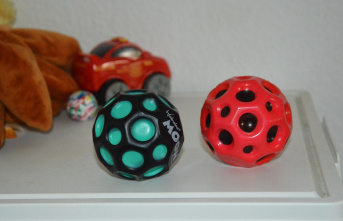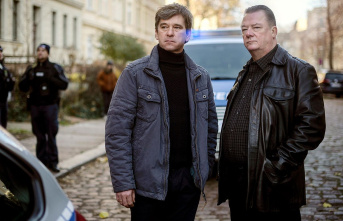The Austrian singer and songwriter Voodoo Jürgens is sort of the opposite of Udo Jürgens. With his wildly tousled curls, his mustache and his penchant for vintage fashion, the 39-year-old produces sympathetically ratty music. With Viennese humor, behind which abysses open up - as for example in his best-known song "Heite gross ma Tote aus" (Today we dig up the dead).
On December 2nd, he and his band Ansa Panier will release their third studio album "Wie die Nocht noch jung wor", which has more in common with Tom Waits than with the entertainment sound of Udo Jürgens.
Voodoo appreciates some of Udo's songs, says the musician, born David Öllerer, in the midst of a heap of instruments in a Viennese recording studio. Beyond that, there are no connecting points. "I didn't really want to make such a big Udo story out of it," he says, preferring to talk about other things.
"circus rumpel act" and lovers
For example about the new album, which is sometimes more enigmatic and richer in metaphors than the two predecessors. There is the song "Hoiber Preis" (Half Price), which sings about the temptations of consumption with the help of an asthmatic harmonium and a tuba. Voodoo Jürgens calls it a "circus rumble act". The song "Fost wie ans" (Almost like one) unfolds a hypnotizing sound, which only seems to revolve around a familiar pair of lovers. "It's about an addiction that becomes like a partner and hangs on," the songwriter clarifies.
However, Voodoo Jürgens' music is not consistently sombre, but often changes between moods - like "Federdress", in which at the end of a red wine-drunk summer all that remains is a black-feathered bird. The song "Es geht ma ned ei" sounds almost like a happy pop song, but describes an unhealthy relationship.
Before David Öllerer immersed himself in the Viennese art and music scene as a teenager, he began an apprenticeship at a traditional pastry shop that once supplied the imperial Habsburg court. Voodoo Jürgens processed the training that was ultimately broken off on the album in the aggressively wobbling waltz "Zuckerbäcker". The work made him depressed at the time, he says. "I thought I went the wrong way". This was followed by a job as a cemetery gardener in Vienna before his career finally moved in the direction of music.
He will be touring in Germany from February
Today, Voodoo Jürgens is an integral part of the Viennese scene, where musicians have revived the Austropop dialect tradition in various ways, from the singer Nino from Vienna to the Wienerlied rapper Kreiml
Voodoo Jürgens already played at the top of the Austrian charts in 2016 with his first album. With second place, he took second place in 2019. He will be touring Germany with the new album from February. His Viennese dialect texts are no obstacle there, even if the audience doesn't understand every word, he says. "I think it's cool that it's possible. It's also possible with English music, which I assume not everyone understands."
And sometimes you can do it without words. "Wie der Nocht noch jung wor" ends with a funeral march called "Odessa", which becomes a lament through the clarinet and saxophone solo by the Ukrainian jazz musician Andrej Prozorov. The piece did without singing, says Voodoo Jürgens. "It's all in there."
Tour calendar Voodoo Jürgens on Youtube












